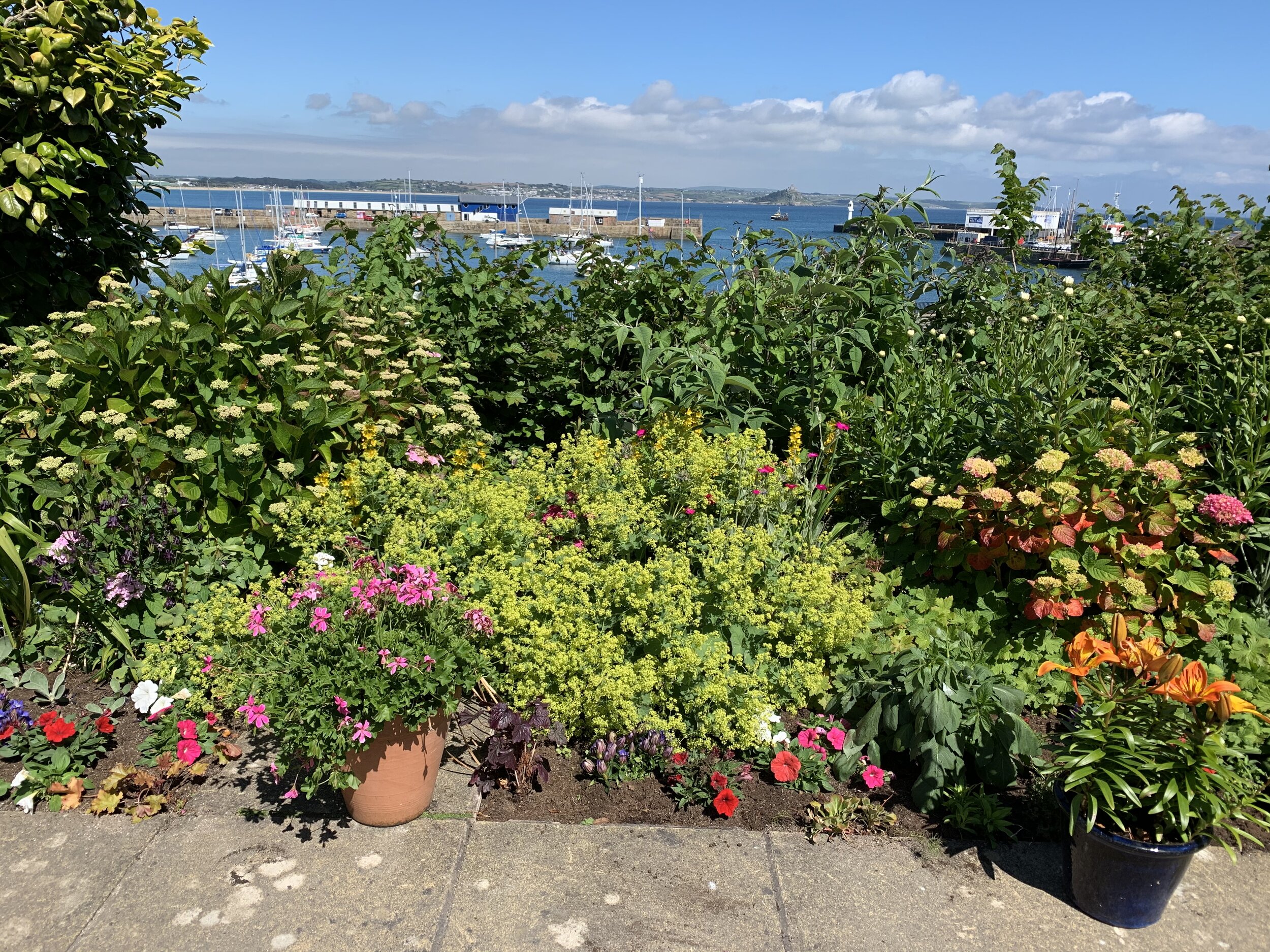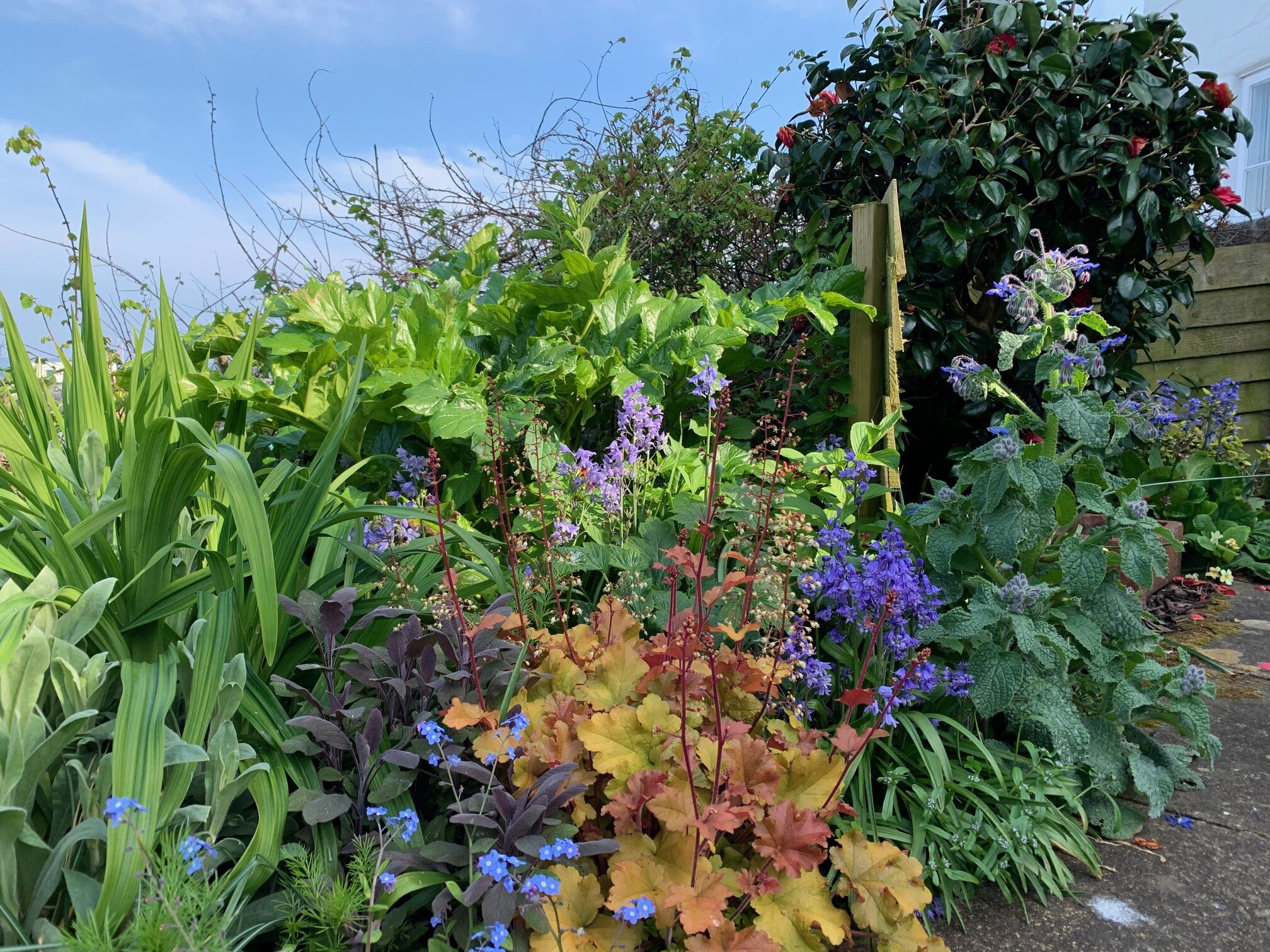Wisdom of the Headmistress by Yukari Werrell
Cottage Garden
June 2021 - just removed few paving stones to extend the garden.
I have a very unique garden, which is on the cliff, facing Penzance harbour and St Michael’s Mount. Most of the ground was covered with pavement for minimum maintenance, but flowers and plants are growing alongside the edges of the garden.
I have had my house renovated over the last six years, and I neglected my garden completely for about the first four years. When the external work on the house was completed, I had to face up to the overgrowing vegetation. I tried several potential gardeners to give me advice to rejuvenate the garden, but they either became ill or non-reachable for one reason or another.
One day in early 2019, Yvonne walked into the garden through a friend’s recommendation. She immediately said “I can create a cottage garden. I can look after it for you.”
She is a retired nurse/social worker, but just loves flowers. When she was a child and had a chance to take the train, she used to get off at each station, and picked up flowers she had never seen before. She also learnt how to grow vegetables from her grandfather. She is carrying a great Cornish tradition with her. I respect her background and asked her to do whatever she would like to do in my garden. (By the way, I am from Tokyo, Japan, and my life has been fairly divorced from “soil” although I used to yearn to grow my own food.)
Yvonne started to prepare the soil with lots of compost and brought some seeds and plants from her garden. We also visited a local nursery together. It was like adopting small children. Once we picked these plants up, she was keen to know how they were getting on in the new soil.
Yvonne comes every Tuesday. Once the plants have settled, she told me I don’t have a lot to do. She visits my garden, looks around, checks the condition of each plant, and says “Everything is fine.” She somehow has an air of a headmistress, inspecting each child in each classroom. If any of them seems to be distressed, she will give a caution to a classroom teacher, who is “myself”.
May 2020 - different hight and different colour…all arranged
Wisdom of the Headmistress
She passed me lots of “wisdom” which helped me to understand life more deeply.
Here are some examples:
“I don’t water plants except ones in pots. Let them find the water. Their roots get deeper.”
Wisdom: Don’t give too much water when bringing up children.
“Spinach and beetroot normally don’t like to be replanted.”
Wisdom: Moving children between two cultures is not really a kind thing to do. One should respect the hardship they go through when their environment has to be changed. (I am not denying the importance of preserving and passing down your own culture, if different from where you live, to the next generation. If your children are grown up to appreciate and cherish your culture, they are enriched individuals.)
“Don’t worry about small insects. Just spray with soapy water, but never cut the leaves for that. You are killing the plant!”
I’d better explain the background of this comment. In the first year, I was shocked to see massive black flies on the back of some leaves, and I ended up cutting a small shrub down. The headmistress was most upset about my stupid act. This year, which is the third year since the headmistress started to come, I got used to insects, and started to see the balance of nature between plants and insects.
Wisdom: Once the plant is established, little insects cannot harm it. If you apply this to the human body, if you have a strong life force, you can brush off any virus.
Wisdom from the Garden
Compost Bin:
This is the first item the headmistress recommended me to purchase.
In the first year, I was shocked to see several slugs, which looked like large sausages, stuck on the back of the compost lid. Soon I adopted my way of thinking. I am actually sharing “food” with slugs. When I prepare vegetables, I divide them into two categories; one for human consumptions and the other, for my slugs.
The amount of my weekly rubbish has gone down dramatically. I have observed how the garden waste is broken down by creepy insects to produce rich soil. I am so grateful that I can play a role in this life cycle.
2020 — Pots of radish, carrots, spring onions, fennel, rockets, coriander, courgette, mint, etc.
Vegetable Patch:
In 2020, during the first lock-down in the UK, we were not allowed to go out of the house unless it was necessary. I examined my shopping pattern. I can stock starches (pasta, rye bread, rice, etc.) and protein (long-life cheese in the fridge and fish in the freezer), but I had to go out to get fresh fruits and vegetables. If I grow my own greens at home, I don’t have to go out for a while.
I started to grow radish and spinach in a small patch of soil. Then I tried rockets, carrots, spring onions. The headmistress gave me tomato, courgette (zucchini) and cucumber plants. Cucumber has been eaten by slugs, but the cherry tomato plant provided me nice red ones to eat every day in late summer. I tried potatoes in a bag as well. Two shooting potatoes ended up 18 potatoes in the autumn!
The headmistress must have felt my craze of growing vegetables in pots and bags are spoiling the overall beauty of the garden. She ensures the garden is painted in different colours by different flowers at different times of the year, and my veg-pots are disturbing her aesthetics. She suggested that I should create a patch in a corner of the garden. And cutting the story short, currently in August, my allotment is full of courgettes and parsnips, after I had a good harvest of rockets, lettuce and spinach in June.
I eat whatever is ready in the garden, and work out how to cook them. My shopping is just to get a few additions such as onions and potatoes (as they require much bigger land to grow). This is a way of life I never imagined possible in the middle of a town. However, human beings must have lived in this way for thousands of years. Excess food can be swapped among neighbours, creating a supportive community. All you need is soil, water, and the sun. Money does not directly produce varieties of food given by nature. It was invented by humans for convenience, as bringing 100 courgettes to swap with 100 bananas would not be practical and too seasonal.
It is now the middle of August, and autumnal feeling started to creep in. It is different from June when everything was growing without hesitation. It is time to mature and make fruits. This seasonal cycle is no difference from a life cycle of human beings. Once I accept this flow of nature, I feel I can grow older more graciously, treasuring the next generations.
May 2021 - Allotment with spinach, lettuce, spring onion. Now (in August) courgette on the left and parsnips on the right are dominating the patch.
…and I am getting a constant supply of courgettes.






